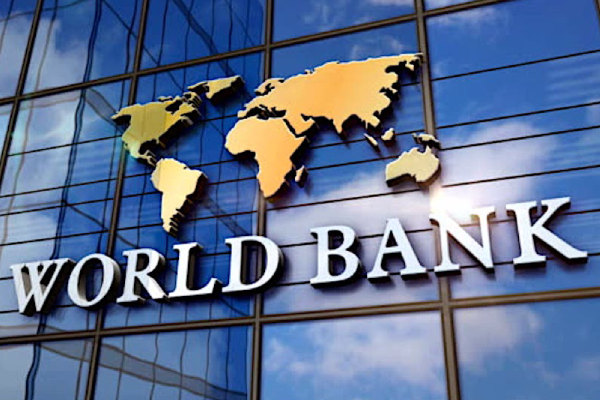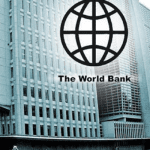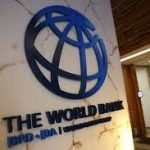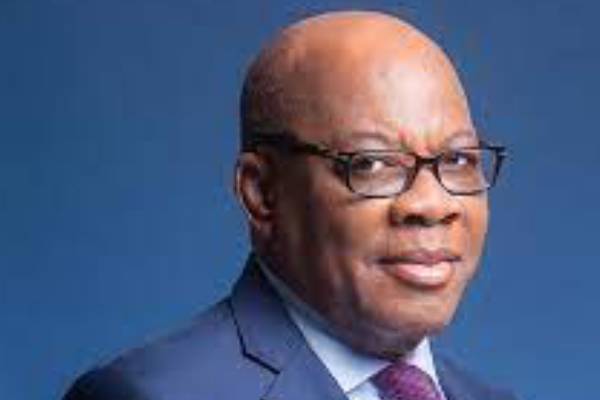Nigeria’s inability to optimise the global oil price rally has worsened its fiscal position as the government faces revenue generation challenges amid an increase debt burden, according to latest report from the World Bank.
The bank added that the country’s reliance on oil has also caused it to be highly vulnerable to global and domestic shocks which heighten its risk of a recession.
[wonderplugin_video iframe=”https://youtu.be/-KKl_j6XKdU” lightbox=0 lightboxsize=1 lightboxwidth=960 lightboxheight=540 autoopen=0 autoopendelay=0 autoclose=0 lightboxtitle=”” lightboxgroup=”” lightboxshownavigation=0 showimage=”” lightboxoptions=”” videowidth=600 videoheight=400 keepaspectratio=1 autoplay=0 loop=0 videocss=”position:relative;display:block;background-color:#000;overflow:hidden;max-width:100%;margin:0 auto;” playbutton=”https://www.tvcnews.tv/wp-content/plugins/wonderplugin-video-embed/engine/playvideo-64-64-0.png”]
According to the banks’ Nigeria Development Update (NDU) for December 2022, and Economic Memorandum, between 2020 and 2021, when oil prices were much lower, the government missed an opportunity to address one of the primary sources of fiscal vulnerability by choosing to maintain the subsidy for petrol, consequently.
As a result, the world bank now believes Nigeria faces a fiscal time bomb amid its low oil production.
Furthermore, because Nigeria is unable to benefit from the oil price boom, the government has resorted increasingly to costly CBN financing, which in turn has increased interest costs, causing severe fiscal and debt challenges. Hence without adequate buffers, the economy is more vulnerable to external shocks more severe than the pre-pandemic period.
According to the NDU, with such intense fiscal pressure, debt servicing is expected to surge, exerting fiscal and liquidity pressures and is projected to reach about 45 percent of GDP in 2027.
Nigeria’s inability to optimise the global oil price rally has worsened its fiscal position as the government faces revenue generation challenges amid an increase debt burden, according to latest report from the World Bank.
The bank added that the country’s reliance on oil has also caused it to be highly vulnerable to global and domestic shocks which heighten its risk of a recession.
[wonderplugin_video iframe=”https://youtu.be/-KKl_j6XKdU” lightbox=0 lightboxsize=1 lightboxwidth=960 lightboxheight=540 autoopen=0 autoopendelay=0 autoclose=0 lightboxtitle=”” lightboxgroup=”” lightboxshownavigation=0 showimage=”” lightboxoptions=”” videowidth=600 videoheight=400 keepaspectratio=1 autoplay=0 loop=0 videocss=”position:relative;display:block;background-color:#000;overflow:hidden;max-width:100%;margin:0 auto;” playbutton=”https://www.tvcnews.tv/wp-content/plugins/wonderplugin-video-embed/engine/playvideo-64-64-0.png”]
According to the banks’ Nigeria Development Update (NDU) for December 2022, and Economic Memorandum, between 2020 and 2021, when oil prices were much lower, the government missed an opportunity to address one of the primary sources of fiscal vulnerability by choosing to maintain the subsidy for petrol, consequently.
As a result, the world bank now believes Nigeria faces a fiscal time bomb amid its low oil production.
Furthermore, because Nigeria is unable to benefit from the oil price boom, the government has resorted increasingly to costly CBN financing, which in turn has increased interest costs, causing severe fiscal and debt challenges. Hence without adequate buffers, the economy is more vulnerable to external shocks more severe than the pre-pandemic period.
According to the NDU, with such intense fiscal pressure, debt servicing is expected to surge, exerting fiscal and liquidity pressures and is projected to reach about 45 percent of GDP in 2027.
Nigeria’s inability to optimise the global oil price rally has worsened its fiscal position as the government faces revenue generation challenges amid an increase debt burden, according to latest report from the World Bank.
The bank added that the country’s reliance on oil has also caused it to be highly vulnerable to global and domestic shocks which heighten its risk of a recession.
[wonderplugin_video iframe=”https://youtu.be/-KKl_j6XKdU” lightbox=0 lightboxsize=1 lightboxwidth=960 lightboxheight=540 autoopen=0 autoopendelay=0 autoclose=0 lightboxtitle=”” lightboxgroup=”” lightboxshownavigation=0 showimage=”” lightboxoptions=”” videowidth=600 videoheight=400 keepaspectratio=1 autoplay=0 loop=0 videocss=”position:relative;display:block;background-color:#000;overflow:hidden;max-width:100%;margin:0 auto;” playbutton=”https://www.tvcnews.tv/wp-content/plugins/wonderplugin-video-embed/engine/playvideo-64-64-0.png”]
According to the banks’ Nigeria Development Update (NDU) for December 2022, and Economic Memorandum, between 2020 and 2021, when oil prices were much lower, the government missed an opportunity to address one of the primary sources of fiscal vulnerability by choosing to maintain the subsidy for petrol, consequently.
As a result, the world bank now believes Nigeria faces a fiscal time bomb amid its low oil production.
Furthermore, because Nigeria is unable to benefit from the oil price boom, the government has resorted increasingly to costly CBN financing, which in turn has increased interest costs, causing severe fiscal and debt challenges. Hence without adequate buffers, the economy is more vulnerable to external shocks more severe than the pre-pandemic period.
According to the NDU, with such intense fiscal pressure, debt servicing is expected to surge, exerting fiscal and liquidity pressures and is projected to reach about 45 percent of GDP in 2027.
Nigeria’s inability to optimise the global oil price rally has worsened its fiscal position as the government faces revenue generation challenges amid an increase debt burden, according to latest report from the World Bank.
The bank added that the country’s reliance on oil has also caused it to be highly vulnerable to global and domestic shocks which heighten its risk of a recession.
[wonderplugin_video iframe=”https://youtu.be/-KKl_j6XKdU” lightbox=0 lightboxsize=1 lightboxwidth=960 lightboxheight=540 autoopen=0 autoopendelay=0 autoclose=0 lightboxtitle=”” lightboxgroup=”” lightboxshownavigation=0 showimage=”” lightboxoptions=”” videowidth=600 videoheight=400 keepaspectratio=1 autoplay=0 loop=0 videocss=”position:relative;display:block;background-color:#000;overflow:hidden;max-width:100%;margin:0 auto;” playbutton=”https://www.tvcnews.tv/wp-content/plugins/wonderplugin-video-embed/engine/playvideo-64-64-0.png”]
According to the banks’ Nigeria Development Update (NDU) for December 2022, and Economic Memorandum, between 2020 and 2021, when oil prices were much lower, the government missed an opportunity to address one of the primary sources of fiscal vulnerability by choosing to maintain the subsidy for petrol, consequently.
As a result, the world bank now believes Nigeria faces a fiscal time bomb amid its low oil production.
Furthermore, because Nigeria is unable to benefit from the oil price boom, the government has resorted increasingly to costly CBN financing, which in turn has increased interest costs, causing severe fiscal and debt challenges. Hence without adequate buffers, the economy is more vulnerable to external shocks more severe than the pre-pandemic period.
According to the NDU, with such intense fiscal pressure, debt servicing is expected to surge, exerting fiscal and liquidity pressures and is projected to reach about 45 percent of GDP in 2027.
Nigeria’s inability to optimise the global oil price rally has worsened its fiscal position as the government faces revenue generation challenges amid an increase debt burden, according to latest report from the World Bank.
The bank added that the country’s reliance on oil has also caused it to be highly vulnerable to global and domestic shocks which heighten its risk of a recession.
[wonderplugin_video iframe=”https://youtu.be/-KKl_j6XKdU” lightbox=0 lightboxsize=1 lightboxwidth=960 lightboxheight=540 autoopen=0 autoopendelay=0 autoclose=0 lightboxtitle=”” lightboxgroup=”” lightboxshownavigation=0 showimage=”” lightboxoptions=”” videowidth=600 videoheight=400 keepaspectratio=1 autoplay=0 loop=0 videocss=”position:relative;display:block;background-color:#000;overflow:hidden;max-width:100%;margin:0 auto;” playbutton=”https://www.tvcnews.tv/wp-content/plugins/wonderplugin-video-embed/engine/playvideo-64-64-0.png”]
According to the banks’ Nigeria Development Update (NDU) for December 2022, and Economic Memorandum, between 2020 and 2021, when oil prices were much lower, the government missed an opportunity to address one of the primary sources of fiscal vulnerability by choosing to maintain the subsidy for petrol, consequently.
As a result, the world bank now believes Nigeria faces a fiscal time bomb amid its low oil production.
Furthermore, because Nigeria is unable to benefit from the oil price boom, the government has resorted increasingly to costly CBN financing, which in turn has increased interest costs, causing severe fiscal and debt challenges. Hence without adequate buffers, the economy is more vulnerable to external shocks more severe than the pre-pandemic period.
According to the NDU, with such intense fiscal pressure, debt servicing is expected to surge, exerting fiscal and liquidity pressures and is projected to reach about 45 percent of GDP in 2027.
Nigeria’s inability to optimise the global oil price rally has worsened its fiscal position as the government faces revenue generation challenges amid an increase debt burden, according to latest report from the World Bank.
The bank added that the country’s reliance on oil has also caused it to be highly vulnerable to global and domestic shocks which heighten its risk of a recession.
[wonderplugin_video iframe=”https://youtu.be/-KKl_j6XKdU” lightbox=0 lightboxsize=1 lightboxwidth=960 lightboxheight=540 autoopen=0 autoopendelay=0 autoclose=0 lightboxtitle=”” lightboxgroup=”” lightboxshownavigation=0 showimage=”” lightboxoptions=”” videowidth=600 videoheight=400 keepaspectratio=1 autoplay=0 loop=0 videocss=”position:relative;display:block;background-color:#000;overflow:hidden;max-width:100%;margin:0 auto;” playbutton=”https://www.tvcnews.tv/wp-content/plugins/wonderplugin-video-embed/engine/playvideo-64-64-0.png”]
According to the banks’ Nigeria Development Update (NDU) for December 2022, and Economic Memorandum, between 2020 and 2021, when oil prices were much lower, the government missed an opportunity to address one of the primary sources of fiscal vulnerability by choosing to maintain the subsidy for petrol, consequently.
As a result, the world bank now believes Nigeria faces a fiscal time bomb amid its low oil production.
Furthermore, because Nigeria is unable to benefit from the oil price boom, the government has resorted increasingly to costly CBN financing, which in turn has increased interest costs, causing severe fiscal and debt challenges. Hence without adequate buffers, the economy is more vulnerable to external shocks more severe than the pre-pandemic period.
According to the NDU, with such intense fiscal pressure, debt servicing is expected to surge, exerting fiscal and liquidity pressures and is projected to reach about 45 percent of GDP in 2027.
Nigeria’s inability to optimise the global oil price rally has worsened its fiscal position as the government faces revenue generation challenges amid an increase debt burden, according to latest report from the World Bank.
The bank added that the country’s reliance on oil has also caused it to be highly vulnerable to global and domestic shocks which heighten its risk of a recession.
[wonderplugin_video iframe=”https://youtu.be/-KKl_j6XKdU” lightbox=0 lightboxsize=1 lightboxwidth=960 lightboxheight=540 autoopen=0 autoopendelay=0 autoclose=0 lightboxtitle=”” lightboxgroup=”” lightboxshownavigation=0 showimage=”” lightboxoptions=”” videowidth=600 videoheight=400 keepaspectratio=1 autoplay=0 loop=0 videocss=”position:relative;display:block;background-color:#000;overflow:hidden;max-width:100%;margin:0 auto;” playbutton=”https://www.tvcnews.tv/wp-content/plugins/wonderplugin-video-embed/engine/playvideo-64-64-0.png”]
According to the banks’ Nigeria Development Update (NDU) for December 2022, and Economic Memorandum, between 2020 and 2021, when oil prices were much lower, the government missed an opportunity to address one of the primary sources of fiscal vulnerability by choosing to maintain the subsidy for petrol, consequently.
As a result, the world bank now believes Nigeria faces a fiscal time bomb amid its low oil production.
Furthermore, because Nigeria is unable to benefit from the oil price boom, the government has resorted increasingly to costly CBN financing, which in turn has increased interest costs, causing severe fiscal and debt challenges. Hence without adequate buffers, the economy is more vulnerable to external shocks more severe than the pre-pandemic period.
According to the NDU, with such intense fiscal pressure, debt servicing is expected to surge, exerting fiscal and liquidity pressures and is projected to reach about 45 percent of GDP in 2027.
Nigeria’s inability to optimise the global oil price rally has worsened its fiscal position as the government faces revenue generation challenges amid an increase debt burden, according to latest report from the World Bank.
The bank added that the country’s reliance on oil has also caused it to be highly vulnerable to global and domestic shocks which heighten its risk of a recession.
[wonderplugin_video iframe=”https://youtu.be/-KKl_j6XKdU” lightbox=0 lightboxsize=1 lightboxwidth=960 lightboxheight=540 autoopen=0 autoopendelay=0 autoclose=0 lightboxtitle=”” lightboxgroup=”” lightboxshownavigation=0 showimage=”” lightboxoptions=”” videowidth=600 videoheight=400 keepaspectratio=1 autoplay=0 loop=0 videocss=”position:relative;display:block;background-color:#000;overflow:hidden;max-width:100%;margin:0 auto;” playbutton=”https://www.tvcnews.tv/wp-content/plugins/wonderplugin-video-embed/engine/playvideo-64-64-0.png”]
According to the banks’ Nigeria Development Update (NDU) for December 2022, and Economic Memorandum, between 2020 and 2021, when oil prices were much lower, the government missed an opportunity to address one of the primary sources of fiscal vulnerability by choosing to maintain the subsidy for petrol, consequently.
As a result, the world bank now believes Nigeria faces a fiscal time bomb amid its low oil production.
Furthermore, because Nigeria is unable to benefit from the oil price boom, the government has resorted increasingly to costly CBN financing, which in turn has increased interest costs, causing severe fiscal and debt challenges. Hence without adequate buffers, the economy is more vulnerable to external shocks more severe than the pre-pandemic period.
According to the NDU, with such intense fiscal pressure, debt servicing is expected to surge, exerting fiscal and liquidity pressures and is projected to reach about 45 percent of GDP in 2027.













